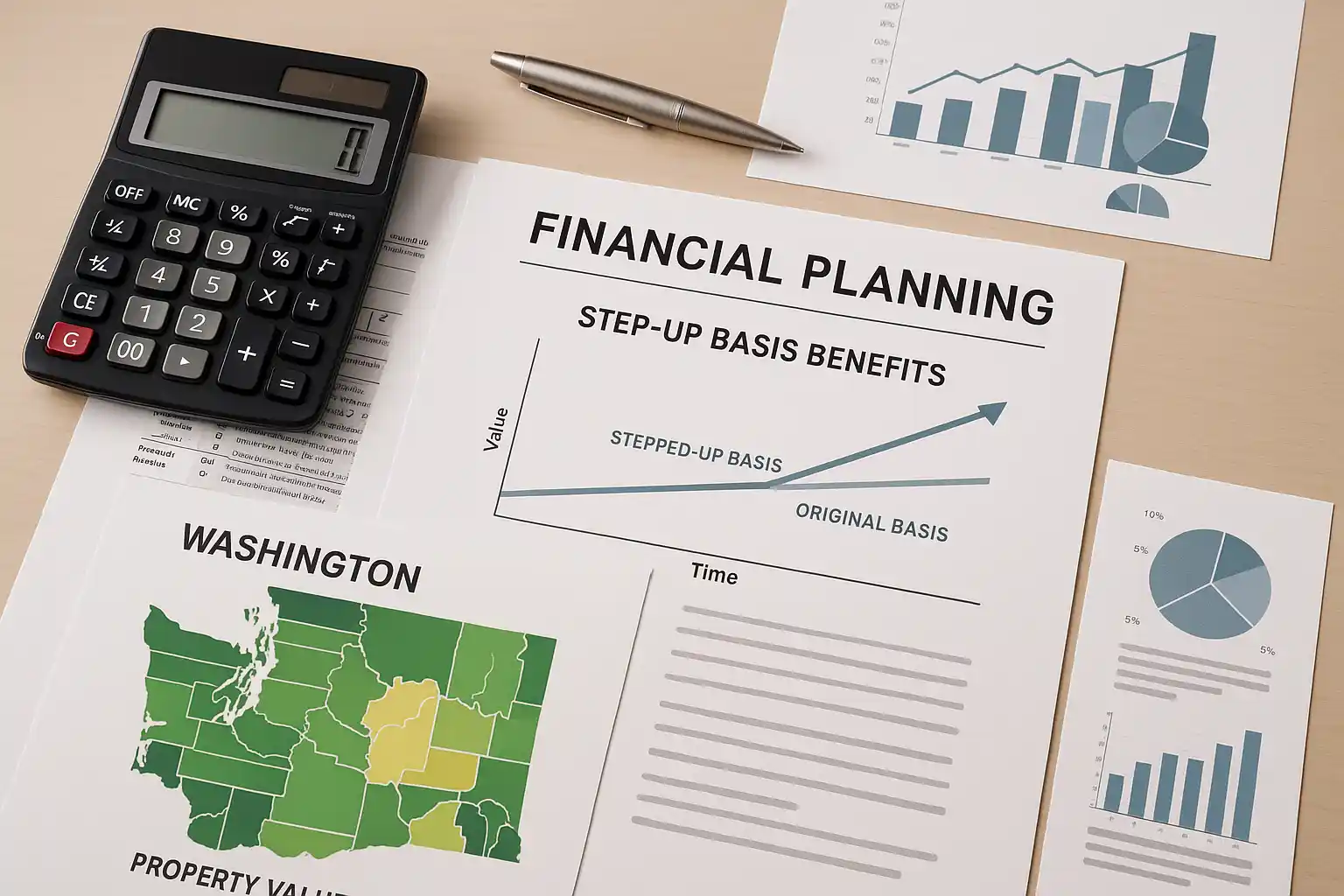How to sell inherited land in Washington: Complete probate (6-12 months), obtain a clear title, then choose between traditional realtor listing, selling yourself, or cash buyers.
Washington's step-up basis eliminates most capital gains tax, and new heir protection laws prevent forced sales. Let’s jump into a complete roadmap to walk you through the process!
Key Takeaways
- Washington's probate process takes 6-12 months minimum, but you can't sell inherited land until it's complete and you have a clear title.
- You'll receive a "step-up basis" equal to the property's value at death, eliminating capital gains tax on previous appreciation.
- The new Uniform Partition of Heirs Property Act protects families from forced below-market sales when multiple heirs inherit together.
Quick Note: If you're looking to skip the traditional sales process, we buy Washington land fast and can provide a free, no-obligation cash offer within 48 hours.

Understanding Washington Probate Laws for Inherited Land
Inheriting land in Washington can feel overwhelming, especially when you're already dealing with the loss of a loved one. Don't worry—Washington's probate laws are designed to be manageable, and understanding the basics will help you navigate this process with confidence.
Washington's Probate Timeline and Process
The probate process in Washington typically takes 6-12 months for straightforward estates, though complex situations involving multiple properties or disputed wills can extend this timeline. Here's what you can expect:
- Initial court filing: Within 4 months of death
- Creditor notification period: 4 months minimum
- Asset inventory completion: Usually within 3 months of appointment
- Final distribution: After all debts and taxes are settled
When You Might Avoid Probate Entirely
Not all inherited property goes through probate in Washington. Your land may skip this process if it was held as:
- Joint tenancy with right of survivorship—ownership transfers automatically to the surviving owner
- Transfer-on-death deed—property passes directly to named beneficiaries
- Trust ownership—assets transfer according to trust terms
Small Estate Simplified Process
Here's some good news: if the entire estate (including the land) is worth less than $100,000, Washington offers a streamlined process using a Small Estate Affidavit. This option:
- Requires no court supervision
- Takes just 30 days after death to initiate
- Significantly reduces legal costs and paperwork
- Cannot be used if real estate is involved (land typically exceeds the threshold)
Key Washington-Specific Requirements
Washington has some unique aspects you should know about:
- Community property state: Property acquired during marriage may have different inheritance rules
- Personal representative duties: A court-appointed person handles estate administration and has specific legal obligations
- Required documentation includes:
- Death certificate
- Will (if one exists)
- Property deeds and tax records
- Inventory of all estate assets
What This Means for Your Land Sale
The bottom line? You'll likely need to complete probate before selling your inherited Washington land. This process ensures a clear title transfer and protects both you and potential buyers. While it adds time to your timeline, it's a necessary step that ultimately makes your property sale legally secure.
Remember, every situation is unique, so consulting with a Washington estate attorney can help you understand exactly what's required for your specific circumstances.

How to Sell Inherited Land in Washington: Step-by-Step Process
Selling inherited land in Washington involves several essential steps, but don't let that discourage you. Once you understand the process, you can move through it systematically and avoid costly mistakes. Here's your complete roadmap from inheritance to closing.
Step 1: Secure and Protect the Property
Before anything else, you need to protect your inherited asset. This is especially important if the land was vacant or unoccupied:
- Change locks if there are any structures on the property
- Maintain property insurance to protect against liability and damage
- Address immediate safety concerns like fallen trees or structural issues
- Arrange for basic maintenance to prevent deterioration
- Document the property's condition with photos for your records
Step 2: Complete Probate Requirements
This is where Washington's legal process kicks in. You cannot sell the property until probate is complete:
Required probate steps:
- File a petition with the county superior court
- Get appointed as personal representative (if you're handling the estate)
- Provide notice to all heirs and beneficiaries
- Notify creditors through newspaper publication
- Complete detailed inventory of all estate assets
Timeline expectations:
- Minimum 4 months for the creditor notification period
- 6-12 months total for most straightforward cases
- 12-18 months if complications arise
Step 3: Obtain a Clear Title
Once probate is complete, you'll need to ensure the property title is clear and marketable:
- Record the distribution order with the county clerk
- Obtain an updated deed showing proper ownership transfer
- Resolve any title issues that may have emerged during probate
- Consider title insurance to protect against unknown defects
Step 4: Understand Washington's Tax Obligations
Here's some good news: inherited property transfers are exempt from Washington's Real Estate Excise Tax (REET). However, when you sell the property, you'll face:
State taxes on your sale:
- Real Estate Excise Tax: 1.28% of sale price (seller typically pays)
- Additional local REET: Varies by county, usually 0.25-0.5%
Federal considerations:
- Step-up basis benefit: Your tax basis is the property's value at death
- Capital gains: Usually minimal due to step-up basis advantage
Step 5: Choose Your Selling Method
Now comes the big decision. You have three main options:
Traditional Realtor Listing
Best for: Properties in good condition with strong market appeal
- Timeline: 3-6 months after probate completion
- Costs: 6-8% commission plus marketing expenses
- Requirements: Property showings, repairs, staging
For Sale By Owner (FSBO)
Best for: Experienced sellers wanting to save on commissions
- Timeline: 4-8 months after probate completion
- Costs: Marketing, legal fees, time investment
- Requirements: Handle all negotiations and paperwork yourself
Cash Land Buyers
Best for: Quick sales, problem properties, or complicated situations
- Timeline: 3-4 weeks after a clear title
- Costs: No fees or commissions
- Requirements: Minimal—sold "as-is"
Step 6: Handle Washington's Disclosure Requirements
Washington requires specific disclosures when selling real estate:
- Form 17 Seller Disclosure: Required for improved properties
- Environmental disclosures: Especially important for rural land
- Known defects: Must disclose material facts about the property
Good news for inherited property: If you didn't live on or closely manage the property, you can indicate "unknown" for many disclosure items.
Timeline Reality Check
Here's what you're looking at for total time from death to closing:
- Probate completion: 6-12 months minimum
- Traditional sale process: Additional 3-6 months
- Total with realtor: 12-18 months
- Total with cash buyer: 6-8 months
The key is to start the probate process promptly and choose a selling method that matches your timeline and situation. Remember, there's no rush to make decisions while you're grieving—but getting started on the legal requirements will give you more options down the road.

Tax Implications: Step-Up Basis and Capital Gains in Washington
Understanding the tax implications of inherited land can save you thousands of dollars and help you make informed decisions about when and how to sell. The good news? Washington's tax structure offers several advantages for heirs, especially when combined with federal step-up basis rules.
The Step-Up Basis Advantage: Your Biggest Tax Break
When you inherit land in Washington, you receive what's called a "step-up in basis"—one of the most valuable tax benefits available to heirs:
- Your tax basis becomes the fair market value at the date of death
- No capital gains tax on appreciation during the deceased's ownership
- Fresh start for calculating any future gains from your ownership
Example: If your parents bought land for $50,000 in 1990 and it's worth $200,000 when you inherit it, your basis is $200,000—not the original $50,000. This eliminates $150,000 in potential capital gains tax.
Washington State Tax Benefits
Washington offers a favorable tax environment for inherited property:
No State Inheritance Tax
- Washington doesn't tax beneficiaries who receive inherited property
- No reporting requirements for most inheritances
- Keep 100% of inherited assets under the exemption limits
Estate Tax Considerations
Washington does impose an estate tax on larger estates:
2024-2025 Exemption Levels:
- Current exemption: $2.193 million per person
- Increasing July 1, 2025: $3 million per person
- Tax rates: 10% to 20% on amounts above the exemption
Federal Tax Implications
While Washington is heir-friendly, federal taxes still apply:
- Federal estate tax exemption: $13.61 million for 2024
- Step-up basis: Applies for federal capital gains calculations
- Capital gains rates: 0%, 15%, or 20% depending on your income
Washington's Capital Gains Tax: Good News for Heirs
Washington's 7% capital gains tax (on gains over $262,000 annually) does NOT apply to inherited property when you sell it, thanks to the step-up basis. This means:
- No Washington capital gains tax on the inherited property sale
- Federal capital gains may still apply if you hold and sell later
- An immediate sale typically results in minimal tax liability
Property Valuation and Documentation
To maximize your tax benefits, proper documentation is crucial:
Required records:
- Date of death appraisal establishing your stepped-up basis
- Property tax assessments from the inheritance year
- Any improvement receipts during your ownership period
- Professional appraisal if the property value is significant
The cost of land in Washington varies significantly by county, making professional valuation especially important for tax purposes.
Professional Consultation Recommended
Tax laws are complex, and every situation is unique. Consider consulting with:
- Estate planning attorney for probate and inheritance issues
- CPA or tax professional for federal and state tax planning
- Real estate appraiser for accurate property valuations
Timing Considerations for Maximum Tax Benefits
The step-up basis advantage is most beneficial when you sell soon after inheriting:
- Minimal capital gains when selling shortly after inheritance
- Carrying costs eliminated by quick sale
- Simple tax reporting with clear documentation
Remember, holding inherited property for years can expose you to future appreciation and capital gains tax on your ownership period—even though you received the step-up basis advantage.

Common Challenges When Selling Inherited Washington Land
Selling inherited land in Washington can present unique obstacles that many heirs don't anticipate. Understanding these challenges upfront helps you prepare for potential complications and make informed decisions about your selling strategy.
Environmental and Regulatory Hurdles
Washington's environmental protections create complex requirements for land sales:
Critical Areas and Wetlands
- Growth Management Act compliance is required for the development potential
- Wetland delineations may be necessary for accurate property assessment
- Critical area buffers can significantly restrict usable land
- Environmental impact studies potentially required for larger parcels
Development Restrictions
Common limitations include:
- Stream buffers and fish habitat protections
- Steep slope and erosion hazard areas
- Endangered species habitat designations
- Shoreline management restrictions
These regulations can make evaluating the Washington land market more complex, as development potential directly affects property value.
Property Condition and Access Issues
Inherited land often comes with maintenance challenges:
- Deferred maintenance from years of minimal attention
- Access road problems affecting property marketability
- Boundary disputes with neighboring landowners
- Encroachment issues that require legal resolution
- Utility availability impacting development potential
Market and Location Challenges
Washington's diverse geography creates selling challenges:
Rural Property Limitations
- Limited buyer pool for remote or unique properties
- Longer marketing periods are required for specialized land
- Lower financing availability for vacant land purchases
- Seasonal access restrictions in some mountainous areas
Timing Pressures
Many heirs face urgent situations:
- Estate settlement deadlines requiring quick action
- Financial pressures from carrying costs and taxes
- Family disagreements about timing and pricing
- Geographic distance makes property management difficult
Tribal Treaty Rights Considerations
In some regions of Washington, inherited land may be subject to tribal treaty rights:
- Fishing and hunting access rights on waterfront properties
- Traditional use areas that may affect land use
- Cultural site protections requiring special consideration
- Co-management requirements for certain natural resources
Financial and Carrying Cost Burdens
Owning inherited land while trying to sell creates ongoing expenses:
Monthly carrying costs:
- Property taxes and assessments
- Insurance premiums
- Basic maintenance and security
- Legal and professional fees
These costs can quickly add up, especially when combined with the emotional stress of managing an inheritance while grieving. For many heirs, these practical challenges make cash buyers an attractive solution—they handle the property "as-is" and close quickly, eliminating the burden of navigating complex regulations and lengthy marketing periods.

Multiple Heirs: Selling Inherited Washington Land with Siblings
Inheriting land with siblings or other family members adds another layer of complexity to an already emotional process. Fortunately, Washington's recent legal changes offer improved protections for heirs who wish to retain family property.
Washington's New Uniform Partition of Heirs Property Act (2023)
Washington enacted this protective law to prevent forced sales of family land:
- Appraisal required before any court-ordered sale
- Right of first refusal given to other heirs
- Fair market value protection prevents below-market forced sales
- Court supervision ensures equitable treatment of all parties
Common Decision-Making Challenges
Multiple heirs rarely agree on everything, creating these typical conflicts:
Financial disagreements:
- Some heirs need cash immediately
- Others want to hold for appreciation
- Disagreement on property value and pricing
- Different financial capabilities among heirs
Practical complications:
- Geographic distance makes coordination difficult
- Varying levels of emotional attachment
- Disagreement on property maintenance and improvements
- Different risk tolerances and investment goals
Legal Solutions When Heirs Disagree
If family discussions reach an impasse, you have several options:
Voluntary Solutions (Preferred)
- Family buyout arrangements where one heir purchases the others' interests
- Professional mediation to facilitate fair agreements
- Property subdivision is legally permissible and economically viable
Court-Ordered Options
- Partition by sale through court supervision
- Partition in kind if the property can be physically divided
- Forced buyout at appraised fair market value
Why Many Multiple-Heir Families Choose Cash Buyers
Cash sales often resolve family disputes quickly and fairly:
- Fast resolution eliminates ongoing family tension
- Equal cash distribution is easier than managing shared property
- No maintenance disagreements during the lengthy sale process
- Guaranteed closing prevents deal failures that restart disputes
When family harmony matters more than maximizing every dollar, cash buyers offer a clean and fast solution that gets everyone paid and moves the family forward.

Fast-Track Option: Selling Inherited Washington Land for Cash
Sometimes the traditional real estate process just doesn't fit your situation. If you're dealing with family complications, time pressures, or simply want to avoid the hassle, cash buyers offer a straightforward alternative.
When Cash Sales Make Sense
Cash buyers work especially well for heirs facing:
- Multiple family members with different opinions and timelines
- Out-of-state living makes property management difficult
- Urgent financial needs for estate settlement or personal reasons
- Problem properties with access issues or needed repairs
The Simple Process
Here's how it typically works:
- Submit property details online or by phone
- Receive cash offer within 24-48 hours
- Accept and sign the purchase agreement
- Close in 21-30 days with professional escrow services
What You Can Expect
No hidden surprises:
- Zero fees or commissions
- Buyer handles all closing costs
- Professional escrow protection
- Properties purchased "as-is"
The best part? You're working with specialists who understand inherited property challenges. They handle the paperwork, work around your schedule, and provide the guidance you need during a difficult time.
If you're ready to sell your inherited land fast in Washington without the typical headaches, a cash offer might be exactly what your family needs to move forward together.

